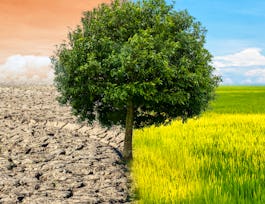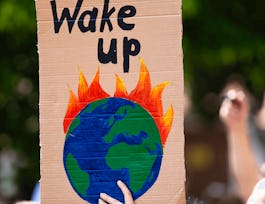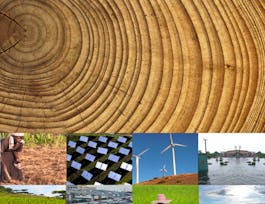Climate change impacts everyone — from record-breaking heat waves, to physical and mental health impacts, to food shortages. Understanding the science behind climate change provides you with the foundational knowledge necessary for taking action in your community and enhancing your career. No matter your age, job, goals, or interests, this course will enable you to meaningfully engage with one of the defining challenges facing humanity today.



Climate Science for Everyone

Instructor: Prasad Kasibhatla
Sponsored by Duke University
1,553 already enrolled
Recommended experience
What you'll learn
Describe the observational evidence for climate change
Explain the physical science basis of climate change
Identify the drivers and trends of greenhouse emissions
Explain how the climate could change in the future
Details to know

Add to your LinkedIn profile
4 assignments
August 2024
See how employees at top companies are mastering in-demand skills


Earn a career certificate
Add this credential to your LinkedIn profile, resume, or CV
Share it on social media and in your performance review

There are 4 modules in this course
Welcome to Climate Science for Everyone! We’ll begin this week by introducing the course and explaining why understanding climate change science is important to you. Then, we’ll quickly discuss a short history of climate change science. Finally, you will learn about the increase in global average surface temperature since the pre-industrial era in the context of international agreements to limit warming. This will provide foundational knowledge for the rest of the course material.
What's included
3 videos11 readings1 assignment3 discussion prompts
This week, you will learn about the energy balance of the earth system and how the increase in global average temperature since the pre-industrial era can be explained in terms of changes in this energy balance.
What's included
3 videos4 readings1 assignment1 discussion prompt
This week, you will learn about how human activities have changed the atmospheric concentrations of the two main greenhouse gasses, carbon dioxide and methane. We will also touch on how the atmospheric concentration of anthropogenic sulfate aerosols, which have offset some of the warming from greenhouse gasses, is changing because of pollution control measures.
What's included
4 videos5 readings1 assignment1 discussion prompt
This week, you will learn how global average surface temperature will evolve over the course of this century under various greenhouse gas emission scenarios. Additionally, we will give you a chance to reflect on what you’ve learned in the course and how you can take action to help with climate change both personally and professionally.
What's included
4 videos10 readings1 assignment1 discussion prompt
Instructor

Offered by
Why people choose Coursera for their career




Recommended if you're interested in Physical Science and Engineering

EDHEC Business School

University of Michigan

The University of Edinburgh

The World Bank Group

Open new doors with Coursera Plus
Unlimited access to 10,000+ world-class courses, hands-on projects, and job-ready certificate programs - all included in your subscription
Advance your career with an online degree
Earn a degree from world-class universities - 100% online
Join over 3,400 global companies that choose Coursera for Business
Upskill your employees to excel in the digital economy


